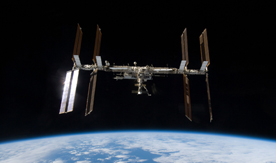
UMaine Research Project to Test Wireless Leak Detection System for International Space Station
University of Maine researchers will design and test a wireless leak detection system for the International Space Station (ISS) that could lead to increased safety on the ISS and for other space activities, as well as on Earth in the event of gas and oil leaks at industrial plants.
The project was one of five in the nation to receive funding from NASA’s Experimental Program to Stimulate Competitive Research (EPSCoR) for research and technology development onboard ISS.
Ali Abedi, a UMaine associate professor of electrical and computer engineering, was awarded a three-year, $100,000 NASA grant through the Maine Space Grant Consortium in Augusta, which consists of higher education institutions and nonprofit research organizations that are actively involved in aerospace-related research and education.
“We are very excited to be selected among the only five groups in the nation to conduct a flight test on ISS,” Abedi says. “This will be a great training experience for our students to learn how to take a prototype out of the lab, and not only to the field but also to space.”
Leaks causing air and heat loss are a major safety concern for astronauts, according to Abedi.
“It is important to save the air when it comes to space missions; find the leak and fix it before it is too late,” he says.
Abedi’s project involves the development of a flight-ready wireless sensor system that will be able to quickly detect and localize leaks based on ultrasonic sensor array signals. The proposed system is fast, accurate and capable of detecting multiple leaks and localizing them with a lightweight and low-cost system, Abedi says.
“Our goal is to push the boundaries of hardware and software in order to design a highly accurate, ultra-low-power and lightweight autonomous leak detection and localization system for ISS,” he says.
The lab prototype was developed by UMaine Ph.D. student Joel Castro and postdoctoral fellow Hossein Roufarshbaf as part of a previously funded NASA EPSCoR project and was tested on UMaine’s inflatable lunar habitat, located in the Wireless Sensing Laboratory (WiSe-Net Lab) on campus. The new funding will allow researchers to make the system more rugged and revise it for a microgravity environment through testing at the NASA Johnson Space Center in Houston, Texas, and then onboard the ISS over the next two to three years.
The testing and verification of the system in a microgravity environment will help determine how well the system performs in space, as well as on Earth.
“Leak detection methods developed for extreme space environments will push the limits of current technology for ground-based leak detection at home and in industrial plants,” says Abedi, who directs the WiSe-Net Lab. The lab conducts research on wireless communications ranging from coding and information theory to wireless sensor networks and space applications, as well as houses the NASA’s lunar habitat.
Vince Caccese, a UMaine mechanical engineering professor, and George Nelson, current director of ISS Technology Demonstration Office at the NASA Johnson Space Center, also are involved with the project.
Proposals from the University of Kentucky, Lexington; Montana State University, Bozeman; University of Nebraska, Omaha; and the University of Delaware, Newark also were funded. Other research includes improving spacewalking suits by incorporating self-healing polymers that are tested against micrometeor impacts.
Contact: Elyse Kahl, 207.581.3747
